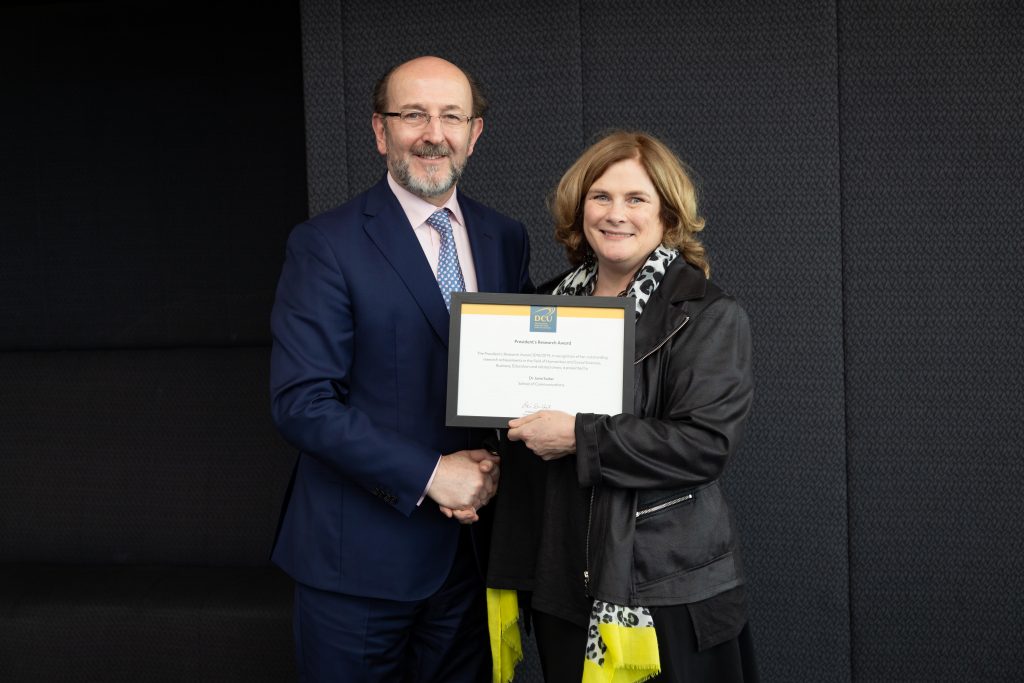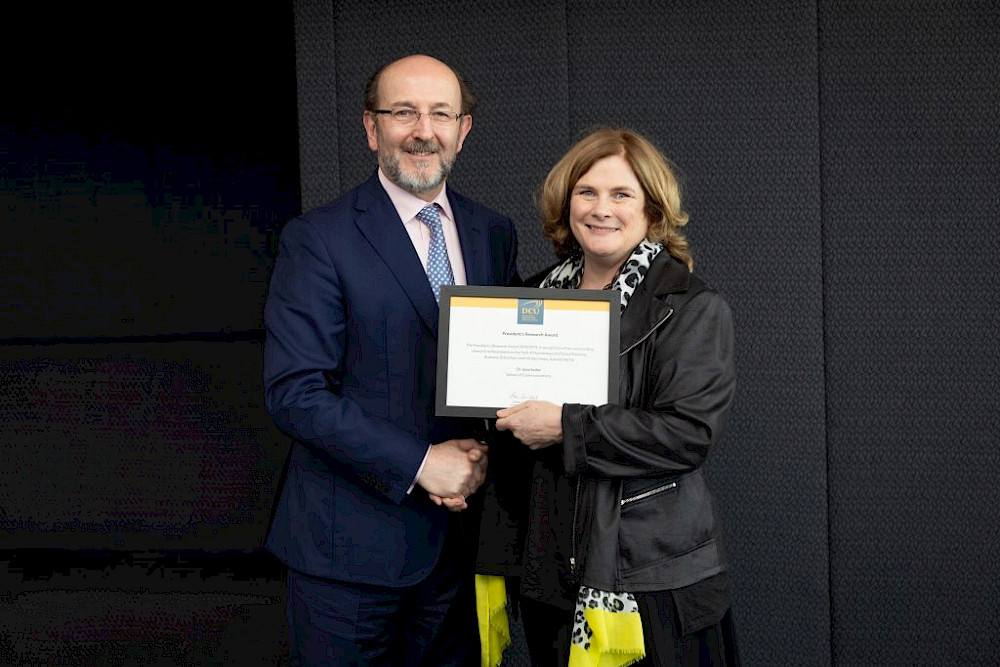Dr Jane Suiter, the founder of the FuJo Institute, was honoured with Dublin City University President's Award for Research.
The awards celebrate DCU researchers with a record of outstanding contributions in their field. Speaking at the ceremony President of DCU, Prof Brian MacCraith, described some of Dr Suiter’s achievements. These included the establishment of the Institute for Future Journalism and Media, multiple articles published in world-leading academic journals as well as editorial roles on numerous journals and developing international multimillion-euro research projects.

He highlighted her work in journalism, information and deliberative democracy. Describing the overall contribution Dr Suiter has made, the DCU President said that the establishment of the Institute has had a considerable impact nationally and internationally and that the Centre is now a beacon of excellence in journalism research thanks to her leadership with considerable attention being paid by significant international journalistic organisations.
Her achievements in working with research colleagues from different academic disciplines highlights the value of multidisciplinary work in creating breakthroughs in social science, he added. In celebrating the impact of the Citizen’s Assemblies, he recognised Dr Suiter as a world-leading academic in deliberative democracy. In honouring Dr Suiter’s contribution to Irish society through the Citizen’s Assemblies, Prof MacCraith said that some of the most significant social changes in Irish society of late can be traced back to these initiatives. He highlighted the Brown Democracy Medal which Dr Suiter and collaborator Professor David of Farrell of UCD are to receive this autumn.
FuJo’s most significant research initiatives led by Dr Suiter such as Jolt and Provenance were also celebrated at the event held in The Helix. The substantial funding and internationality of FuJo’s projects were described by Prof MacCraith as leading research in the humanities and social sciences, and that such investment is reflective of the importance and complexity of the social problems being addressed.
Describing her support of early career researchers, Prof MacCraith recognised Dr Suiter’s passion for developing interdisciplinary researchers that have technological literacy and proficiency in the most essential values of journalism. At the event, Dr Suiter presented some of her work on the Citizen’s Assemblies, Jolt and Provenance as well as the Digital News Report.
Citizen’s Assemblies
The Citizen’s Assemblies began in 2011, on the back of the recession and during a climate of increased distrust of politics, journalism, and sciences. To address this, Dr Suiter along with Prof Farrell in UCD and other colleagues developed a way to re engage citizens in political processes, with an experimental citizen’s assembly We the Citizens, funded by Atlantic Philanthropies. “Most people feel that the ‘elites’ don’t listen to them, and this can be used and played with by populist authoritarians. So one of the answers was to engage with people,” said Dr Suiter.
The Citizen’s Assemblies are now an important, emerging feature of democracies internationally with Dr Suiter taking her work to the UN to develop guidelines for divided states. She is currently working with Dr Anastasia Deligiaouri on Peredep in FuJo to scale-up a digital deliberative process for the EU.
Jolt
The development of the JOLT project came in response to a growing need to address the role of journalism in the public sphere. It aims to harness digital and data technology for journalism by developing 15 PhD projects to deliver new theoretical insights, technical advancements, and best-practice guidelines for journalism and the news industry. Reflecting the multi-disciplinary nature of the project, three of the researchers are based in DCU’s Insight Centre and four are based in the School of Communications.
Provenance
To address the growth of disinformation and support audiences in the understanding what they consume and share on social media, Dr Suiter is leading Provenance. The premise was that it is too challenging to be in an arms race with disinformation but that there might be a way to support citizens and improve the information environment by building immunity to low quality content while fostering values of trust and openness. By working with the Adapt Centre and others as well as cognitive scientists, the aim is to develop digital solutions that will make it easier for consumers to evaluate online information by providing a simple, graphical guide – almost like a nutritional label – that will clarify the source and history of a piece of content.
Finally, Dr Suiter thanked her colleagues in the School of Communications and in the wider Faculty of Humanities and Social Sciences for their support. Additionally, she thanked the members of the FuJo Institute, and SFI Centres Insight and Adapt which include political scientists, electronic engineers, ethicists, journalism researchers and media scholars, and underlined the benefits of multidisciplinary research. “Complex problems need a level of complexity in the research that addresses it. No one field of research can do it on its own,” she said.



